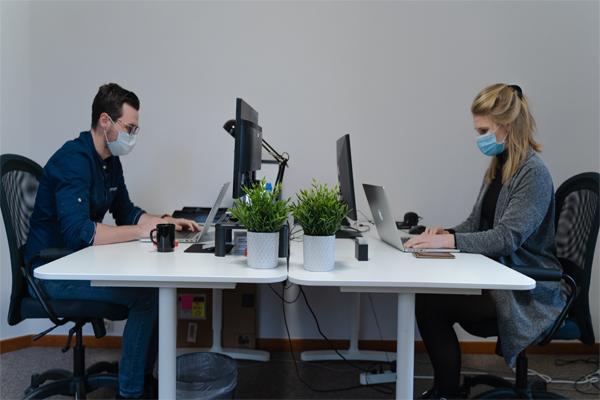Despite the advantages, walking blindly into hybrid working could lead to discrimination and lack of diversity, according to a UK firm of business psychologists.
Hybrid working may inadvertently discriminate against individuals and groups, and drag businesses back decades, warned the Cambridge-based company OE Cam. Without considered planning, organisations could also suffer significant damage to their performance, reputation and staff retention. So it’s urging leaders to seriously consider the “unintended negative implications and complexities of hybrid work models”.
The firm’s business modelling suggests that planned hybrid policies are likely to lead to greater discrimination and a lack of diversity within organisations in the UK and offices worldwide. The very flexibility to work from home that is being welcomed by employees, may inadvertently lead to a detrimental impact on careers, according to OE Cam. And those who choose the ‘work from home’ option could actually miss out on opportunities.
EQUAL OPPORTUNITIES UNDERMINED
OE Cam’s insights into hybrid working has revealed that organisations could face having to backtrack on diversity initiatives that have taken decades to put in place. Diversity and Inclusion (D&I) policies – that ensure women, the disabled, parents, older workers and culturally diverse employees have equal opportunities in the workplace – could be seriously undermined.
The team of organisation consultants and psychologists at OE Cam has explored how businesses will be affected as they move to a hybrid working model. The formation of ‘in-groups’ and ‘out-groups’, something that has been noticed by organisations during remote working, will become even more prominent in a hybrid workforce, noted the experts. Additionally ‘present privilege’ – those in the workplace are more likely to be involved in spontaneous discussions in the office; and have better access to the boss – meaning that they are more front of mind for that promotion.
However, those working remotely, who may potentially include greater numbers of working mothers, the disabled and minority groups, will be left at a disadvantage; finding themselves a part of the ‘out-group’, noted OE Cam. Over time this could lead to them becoming “unnoticed, left without a voice and fewer opportunities to contribute or progress”.

DAMAGING CONSEQUENCES OF HYBRID MODELS
Martyn Sakol, Managing Partner at OE Cam said he has seen first-hand how remote workers can become disadvantaged over their physically present colleagues. “A team was considering a significant deal. It adjourned for a planned break. Those who were working remotely logged off to take a comfort break alone, while those in the office continued group conversations. When the meeting resumed, it became glaringly apparent that the opinions on how to shape the deal had changed amongst the office-based team. Their new stance did not reflect conversations that had included any remote participants. It was apparent at this point that the implications to businesses worldwide could be hugely damaging,” explained Sakol.

The main issue for organisations “will be how to reduce the effects of out-groups”, pointed out Sakol. “Businesses must be mindful of which employees are the ones most likely to wish to work remotely most of the time. Experts believe that there are certain groups this will include: those with caring responsibilities, parents (with more mums choosing, or even feeling obliged, to work remotely over dads); disabled employees – for whom the commute can be more difficult; and older generation workers, hoping to improve their work-life balance.”
Firms must take active steps to prevent these members of staff “from losing their voice, their ability to contribute effectively to the business and their chance of promotion”, advised Sakol. “This is not something that will just ‘work itself out’ as teams become accustomed to hybrid working.”
OFFICE ‘PLAYGROUNDS’ FOR THE YOUNG
Age imbalance between city-dwelling young staff and commuting senior managers will also create challenges. OE Cam warns that offices could become “playgrounds for young, inexperienced employees” working without hands-on managerial support. The lack of experience, guidance and support from experienced peers will lead to weaker employee development, affecting complex decision-making, creativity and collaboration. Those inexperienced, professionals may unknowingly use their ‘present privilege’ to shape the business and create a new culture that is misrepresentative and potentially destructive.

“Hybrid offers huge advantages, but the risks must not be underestimated,” warned Sakol. “Business leaders must take note of all the impacts and consider the complexities to ensure they cover all bases for all employees. No-one should be compromising their career by choosing to work from home more. No business should lose the value of their team’s inputs, because they have not been given equal ability to make an impact.”
OE Cam recommends that organisations engage their management teams now to consider the complexities and understand the effect hybrid can have on their operations. For more information on OE Cam’s Leading the Shift to Hybrid report findings click here.
A hybrid working model is likely to become the norm when restrictions are lifted, as nearly one in five UK employees prefer not to return to the office full-time, reveals a new study. Click here to read more.







































